CIVIL SOCIETY WATCH 12 - 16 SEPTEMBER
This week — State Capture Commission conference, remembering Steve Biko, and launch of climate reporting guide
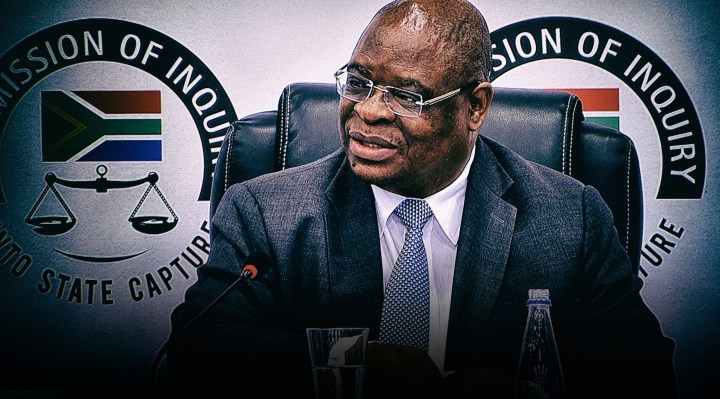
The 7th SA TB Conference is taking place at the Durban International Convention Centre; Open Secrets and the Unpaid Benefits Campaign are hosting a ‘People’s Hearing on Unpaid Pensions’; and the Rethinking Economics for Africa Festival is kicking off at Wits University in Johannesburg.
Monday 12 September marks 45 years since anti-apartheid activist Steve Biko was murdered in police detention.
Biko was a prominent voice of black liberation between the mid-1960s and his death in 1977, according to South African History Online. He worked with others to guide the movement of student discontent into a political force.
“Though Biko was killed before his 31st birthday, his influence on South Africa was, and continues to be, profound.”
In August 1977, Biko and another activist were seized at a police roadblock and jailed in Port Elizabeth. Biko was later transferred to the Sanlam Building, where the security police were based. Here he was beaten to the point of suffering a brain haemorrhage. Police chose to drive Biko to Pretoria, some 700km away, while he was suffering from his injuries. Biko died in his cell on the night of 12 September 1977.
Read more about Biko’s life and activism here.
Monday is also the International Day for South-South Cooperation.
South-South cooperation involves a broad framework of collaboration between countries in the South, in domains such as politics, economics, culture, the environment and technology, according to the United Nations (UN) information page on the observance.
The objectives of South-South cooperation include:
- Enhancing countries’ creative and technological capacities to find solutions to their development problems;
- Allowing the exchange of experiences, leading to a greater awareness of common problems and wider access to available knowledge; and
- recognising and responding to the problems and requirements of the least developed countries, landlocked developing countries, small island developing countries, and those countries most seriously affected by natural disasters and other crises.
“As we move towards a post-pandemic reality and recovery, South-South cooperation will contribute to breaking the cycle of poverty, instability and development inequalities while promoting national development strategies,” according to the UN.
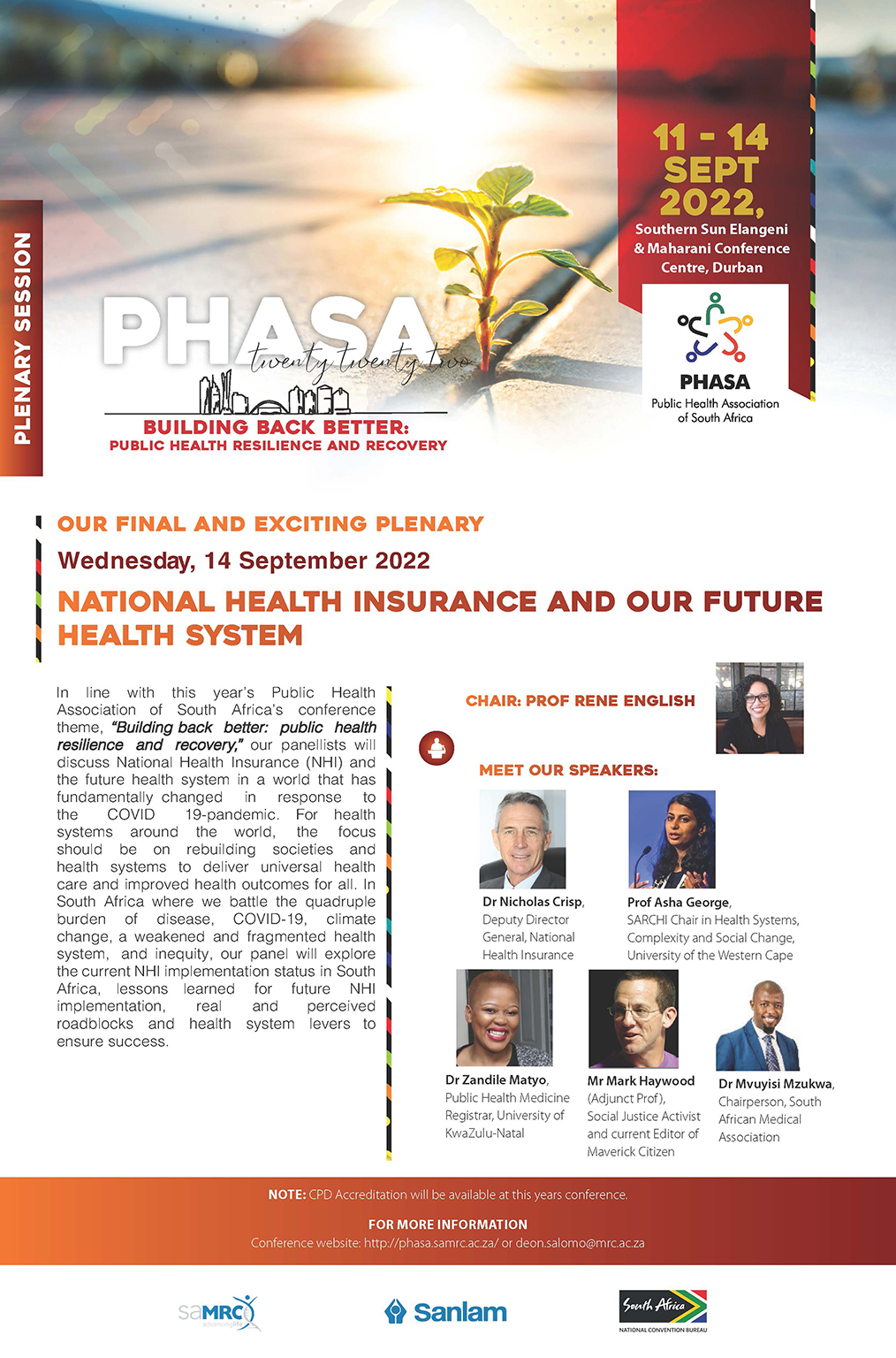
On Monday, 12 September, at 8.30am, the second day of the Public Health Association of South Africa’s (Phasa) 17th annual public health conference kicked off in Durban. The conference started on Sunday 11 September, and will run until Wednesday 14 September.
The theme of the conference is “Building back better: Public health resilience and recovery”. It is intended to provide a forum for public health practitioners and interested stakeholders to share their experiences and research, discuss topical public health issues and mentor public health students and young researchers.
“In the past two years, South Africa has boldly faced four Covid-19 waves and is now looking towards rebuilding our society and health system to deliver universal health care and improved health outcomes for all,” according to the event description.
“…the Phasa 2022 conference will provide an ideal setting to stimulate robust discussions on progress made, critical reflections on the challenges encountered, and vibrant dialogue on how to shape a post-Covid-19 pandemic health system and world, where all people are able to attain a state of health that enables them to lead socially and economically productive lives.”
On the final day of the conference, there will be a session on “National Health Insurance [NHI] and our future health system”. Panellists will discuss the NHI and the future health system in a world that has fundamentally changed in response to the Covid-19 pandemic.
Speakers at this session will include Dr Nicholas Crisp, deputy director general for the NHI in the Department of Health; Professor Asha George, Sarchi chair in health systems, complexity and social change at the University of the Western Cape; Dr Zandile Matyo, public health medicine registrar at the University of KwaZulu-Natal; Mark Heywood, editor of Maverick Citizen; and Dr Mvuyisi Mzukwa, chairperson of the South African Medical Association.
On Tuesday, 13 September, at 8.30am, the 7th SA TB Conference (South Africa Tuberculosis Conference) will kick off at the Durban International Convention Centre. The conference will run until Friday, 16 September.
Goals of the conference include:
- Re-energising the TB community through the in-person interaction of academic, governmental, NGO and civil society stakeholders;
- Creating understanding of the setbacks in TB control and research due to the Covid-19 epidemic;
- Ensuring the exploration of the opportunities to get back on track; and
- Fostering understanding of the latest advances in TB prevention, diagnosis and treatment, including discovery, development and implementation.
Register here.
On Tuesday at 10am, Open Secrets and the Unpaid Benefits Campaign are hosting a “People’s Hearing on Unpaid Pensions” at the Women’s Jail, Constitution Hill, Braamfontein, Johannesburg.
The hearing is intended as a tool to advocate for justice and the payment of benefits for those who have been failed due to “a lack of urgency and a sustained failure to act to ensure that beneficiaries are paid by the Financial Sector Conduct Authority (FSCA) (regulator), government, Parliament, trade unions and public sector benefit schemes”, according to the event description.
“Up to 5 million people in southern Africa have not received pensions owing to them or their beneficiaries from private pension funds. This is an urgent issue, the resolution of which has the potential to improve the material conditions for millions of people. However, a mix of private profiteering and poor state regulatory oversight has worked against the interests of potential claimants.”
The hearing will be chaired by Advocate Geoff Budlender; Amanda Rinquest of Black Sash; and activist Shaeera Kalla.
RSVP for the event here.
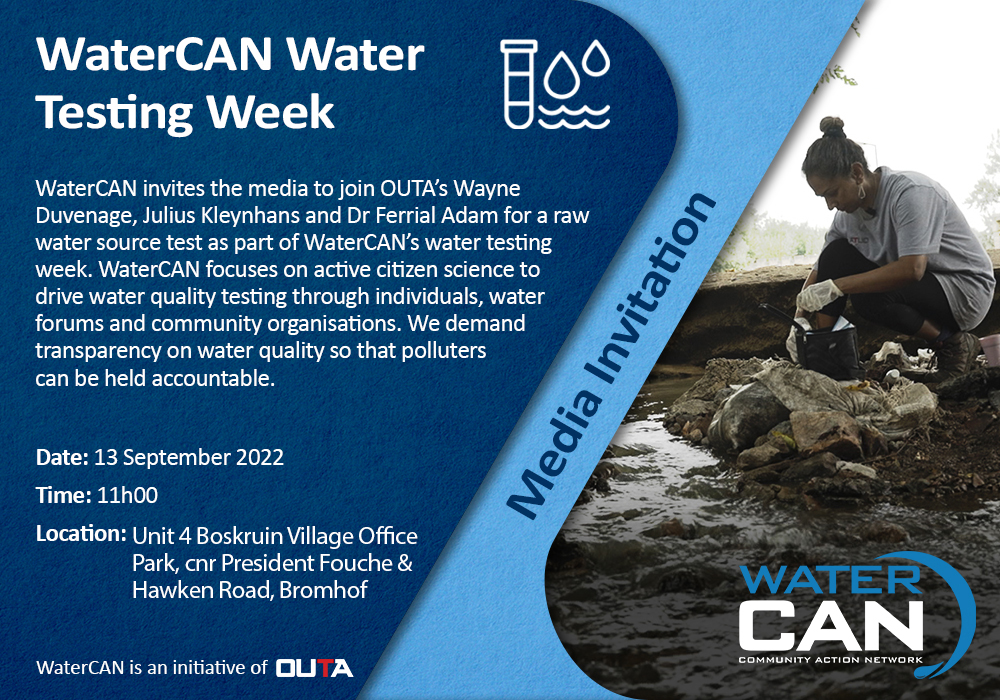
On Tuesday at 11am, WaterCan will be conducting a raw water source test as part of its water testing week. The event will be attended by Dr Ferrial Adam, Julius Kleynhans and Wayne Duvenage of the Organisation Undoing Tax Abuse (Outa).
WaterCan is a programme of Outa that seeks to use a citizen science approach to empower civil society to manage water quality testing, data and information in order to drive corrective actions and accountability in protecting South Africa’s water resources.
The raw water source test will take place at Unit 4 Boskruin Village Office Park on the corner of President Fouche and Hawken Road, Bromhof, Johannesburg. Members of the media are invited to attend.
WaterCan’s water testing week will run from 14 to 18 September. It involves a network of citizen scientists testing the water in taps, rivers and streams.
“South Africa’s water resources are in a dire state and require all of us [to] become water guardians to monitor and protect this precious resource. This is just the beginning of testing our drinking water. As we move forward, we need people to be our eyes, ears and voices on the ground to monitor and protect our water but also to hold those responsible accountable,” according to the event description.
To be a part of WaterCan’s water testing week, send an email to [email protected].
Visit Daily Maverick’s home page for more news, analysis and investigations

On Wednesday, 14 September, at 9am, the Public Affairs and Research Institute and Council for the Advancement of the South African Constitution will be hosting the first day of the State Capture Commission Conference at the University of Johannesburg.
The conference, which will run until 15 September, is intended to convene civil society members and interested parties to engage meaningfully on the findings and recommendations of the Zondo Commission.
“The two-day programme will look at, amongst other issues, the role of private sector enablers in State Capture, the need for public procurement reform, and the challenges with personnel practices in public administration,” according to the event description.
The conference will also unpack:
- What opportunities the establishment of an anti-corruption agency could offer in view of the National Anti-Corruption Strategy;
- The need to strengthen the protection of whistleblowers;
- The role of Parliament in enabling State Capture; and
- Some proposed mechanisms to strengthen oversight and accountability going forward.
The keynote address will be given by Terence Nombembe, head of investigations in the State Capture Commission of Enquiry.
Register for the conference here.
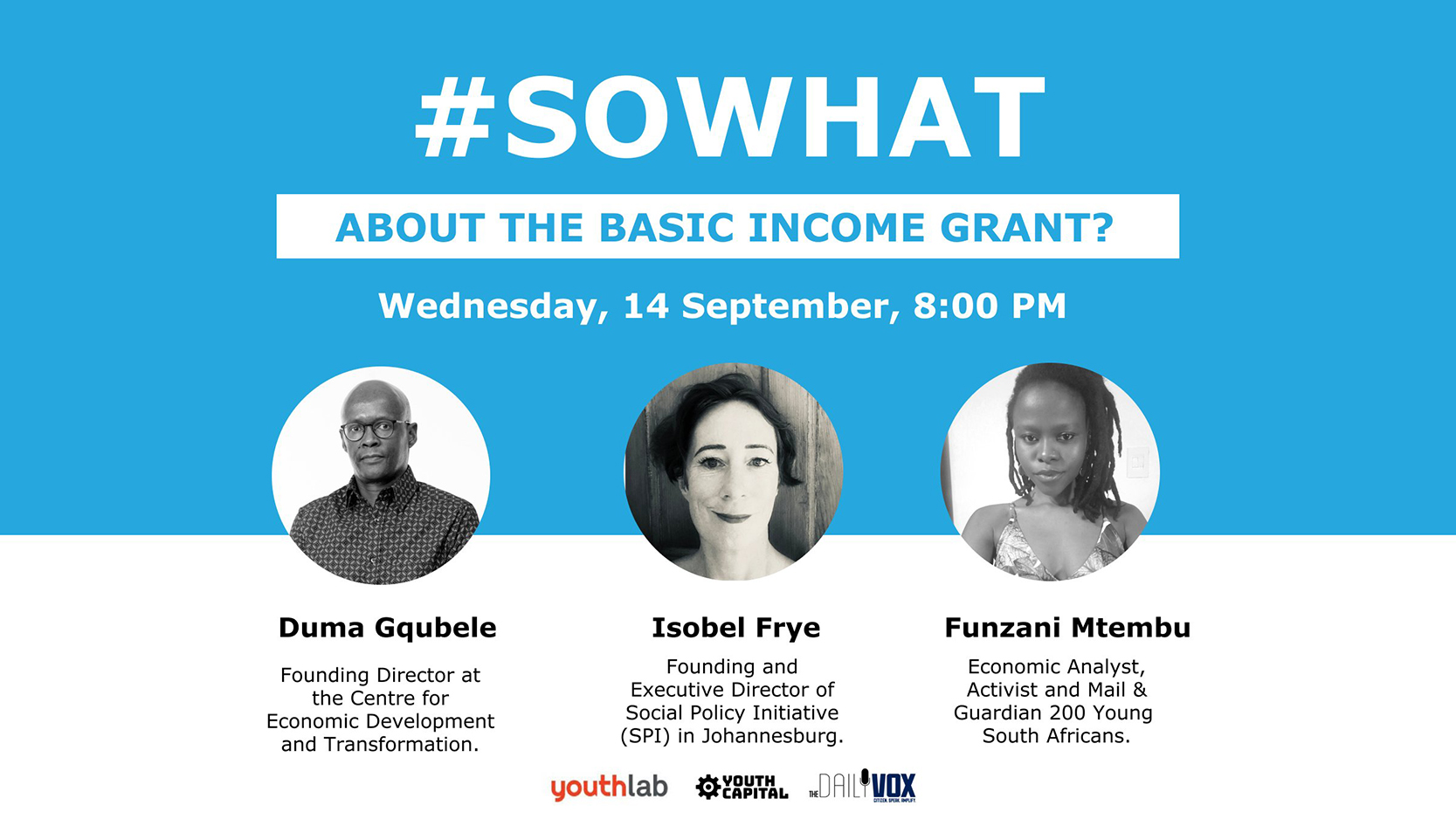
On Wednesday at 8pm, Youth Capital will be hosting a Twitter Space on the topic, “What is the economic case for the Basic Income Grant (BIG)?”
Speakers at the event include Duma Gqubule, founding director at the Centre for Economic Development and Transformation; Isobel Frye, founding and executive director of Social Policy Initiative in Johannesburg; and Funzani Mtembu, economic analyst and activist.
Set a reminder for the space here.
Thursday 15 September is the International Day of Democracy.
The observance is an opportunity to review the state of democracy around the world. This year, Democracy Day will focus on the importance of media freedom to democracy, peace and the fulfilment of the UN Sustainable Development Goals.
“While the Covid-19 crisis has resulted in major challenges globally, a new upheaval in Europe is reminding the world that our democratic principles are constantly under threat. In fact, now more than ever, democracy is backsliding, civic space is shrinking, distrust, mis- and disinformation are growing, while threats to the freedom of journalists and media workers are expanding by the day,” stated the UN.
“Free, independent and pluralistic media, able to keep the public informed on matters of public interest, is a key ingredient to democracy. It enables the public to make informed decisions and hold governments to account. When media freedoms are under threat, the flow of information can be stifled, skewed or cut off entirely.”
On Thursday, there will be an urgent court hearing in the North Gauteng high court in the case between homeless residents of Alberts Farm Conservancy in Johannesburg and the Johannesburg Metropolitan Municipality.
About 25 homeless people are seeking to have their latest evictions declared unlawful and unconstitutional, as well as to be paid R5,000 as compensation for the damage and loss of property they suffered during the eviction attempt.
Read more about the situation here.
At 4.30pm on Thursday, Iranti will be hosting its second leadership roundtable on “Fundraising and Resource Mobilisation”.
The themes that will be explored during the roundtable include:
- How to engage donors;
- The importance of involving the entire organisation in fundraising;
- Building organisational sustainability; and
- The fundraising and resource challenges and opportunities facing the movement.
“Our panel of donor partners will share their insights, experiences, and advice regarding resource mobilisation,” according to the event description.
“The purpose of this roundtable discussion is to give executive directors and leaders of small and startup LGBTIQ organisations access to critical information about how to fundraise and grow their organisations.”
Register here.
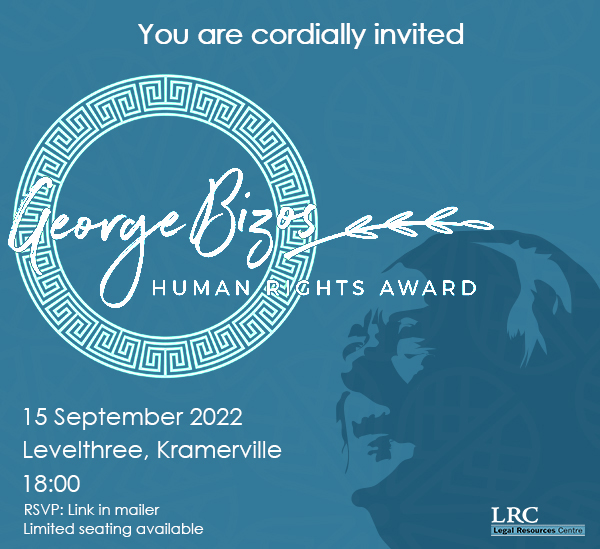
On Thursday at 6.30pm, the Legal Resources Centre will be presenting the 2022 George Bizos Human Rights Award at 14A Kramer Road, Kramerville, Johannesburg.
“The award honours the outstanding contribution made by George Bizos SC in the pursuit of freedom, justice, and democracy,” according to the event description.
The recipient is someone who has displayed remarkable leadership in the pursuit of equality and justice for all.
RSVP here.
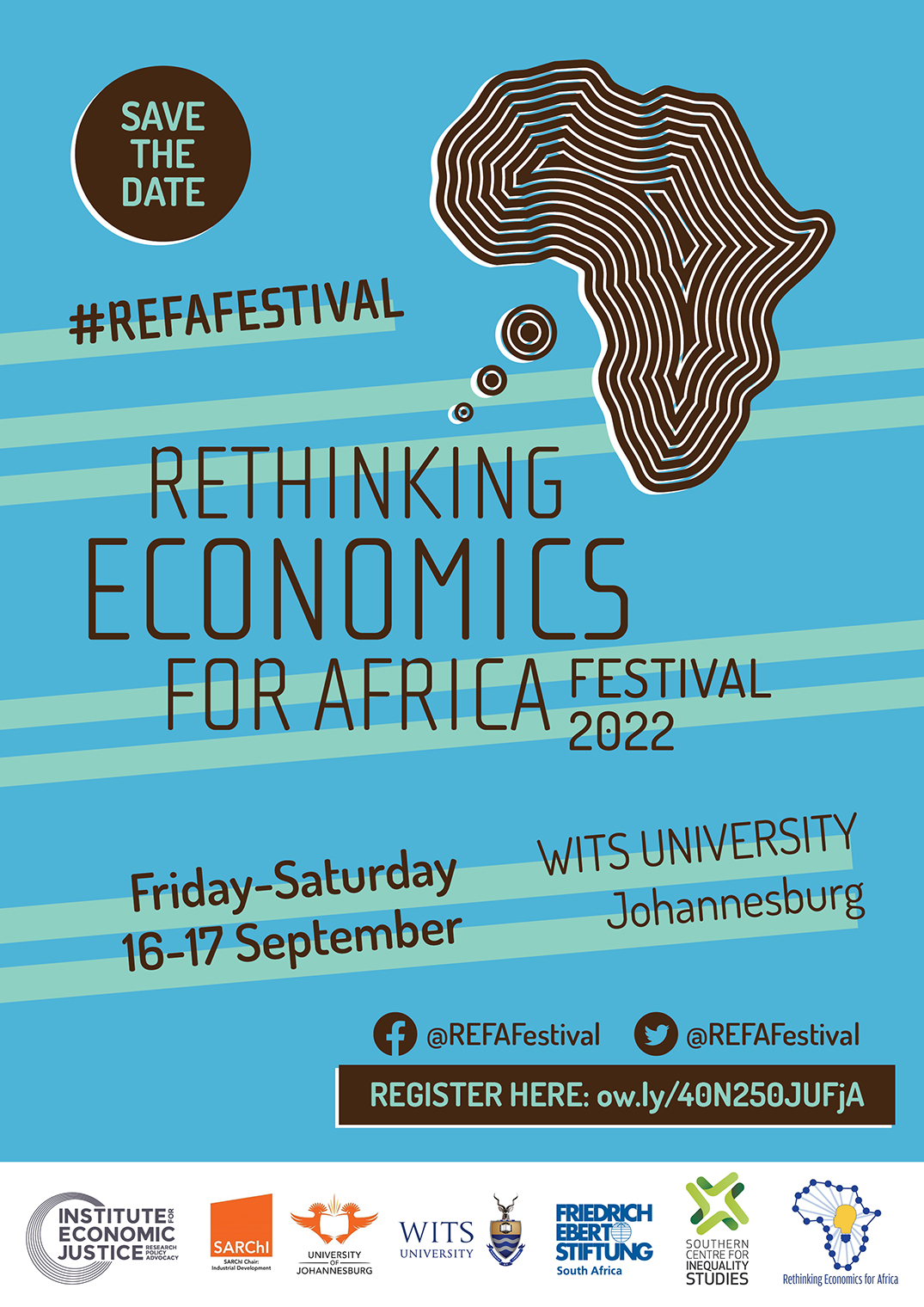
On Friday, 16 September, at 8am, the Rethinking Economics for Africa Festival will kick off at Wits University in Johannesburg, with the aim of challenging the economic orthodoxy and embracing the heterodoxy.
The festival’s two-day programme, which runs from 16 to 17 September, includes transformative content and a diverse range of local and international speakers.
“The Festival will serve as a platform for critical engagement with the economics discipline and with the economy in general, and will provide an opportunity to exchange ideas and tools on how to build a movement for rethinking economics in our universities and society more broadly,” according to the event description.
The event is hosted by the Institute for Economic Justice in partnership with the Friedrich-Ebert-Stiftung South Africa Rethinking Economics for Africa student chapters; the South African Research Chair in Industrial Development; the Southern Centre for Inequality Studies; and Wits University.
Register for both days individually here.
On Friday at 11am, Fossil Free South Africa will be launching their Climate Reporting Guide for SA Media.
The guide is intended for South African journalists covering stories about climate, the environment and energy.
“It contains information on how the global climate emergency affects South Africa, tips for journalists on how to report accurately on global heating, tips for editors on how to give the issue due prominence, a list of contact organisations and people for comment, and information on fossil-fuel divestment,” according to the event description.
“The guide has been written by Fossil Free SA, and reviewed by partners and experts. It is a working document and we welcome feedback.”
The reporting guide can be found here.
Register for the launch here.
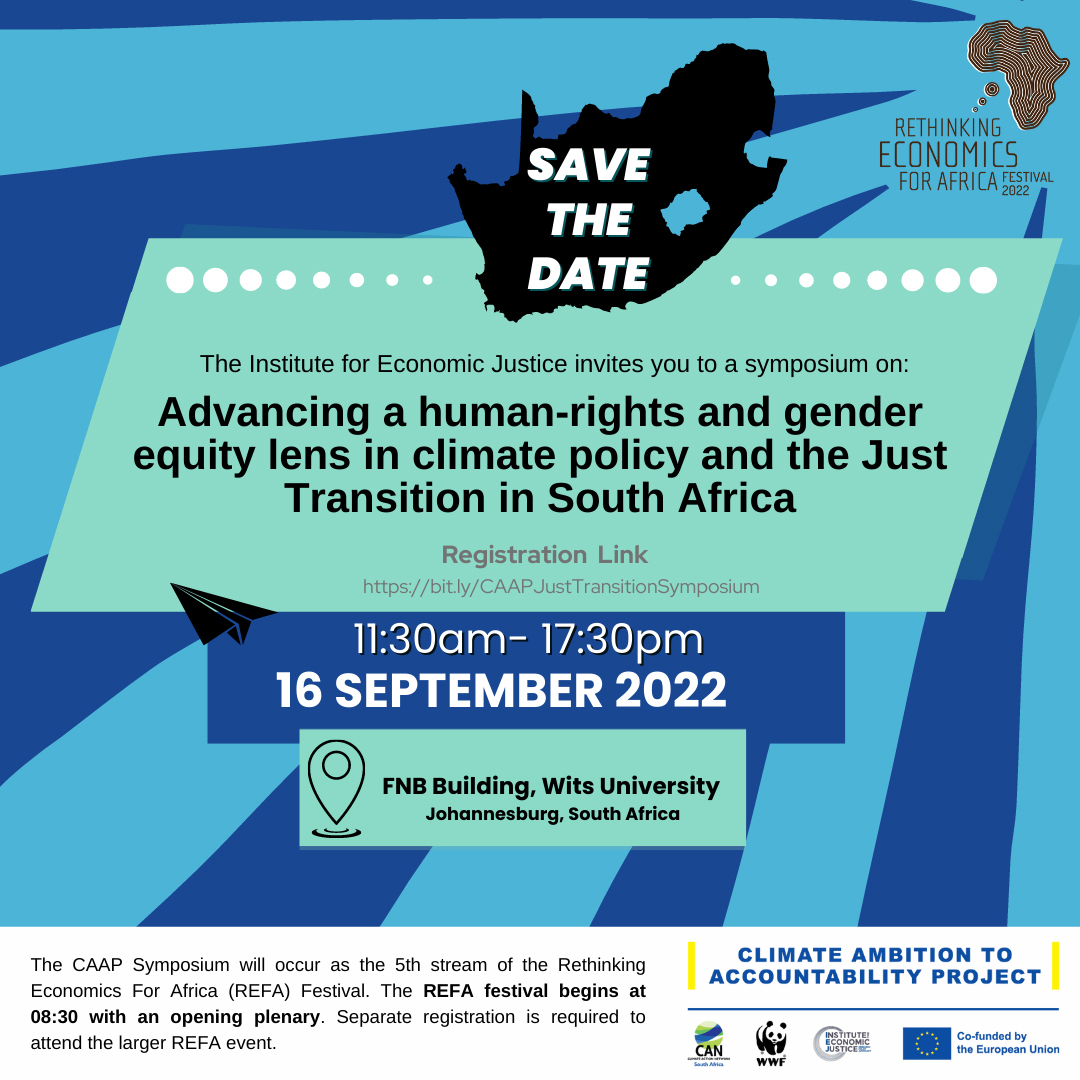
On Friday between 11.30am and 5.30pm, the Institute for Economic Justice — as part of the Climate Ambition to Accountability Project — is hosting a Climate Justice Symposium on “Advancing a human rights and gender equity lens into climate policy and the just transition in South Africa”.
The symposium, taking place at Wits University, aims to:
- Surface human and gender-rights violations in the renewable sector;
- Discuss how current climate policy fails to account for any rights violations; and
- Devise ways to mainstream human and gender justice within a just transition.
Register here.
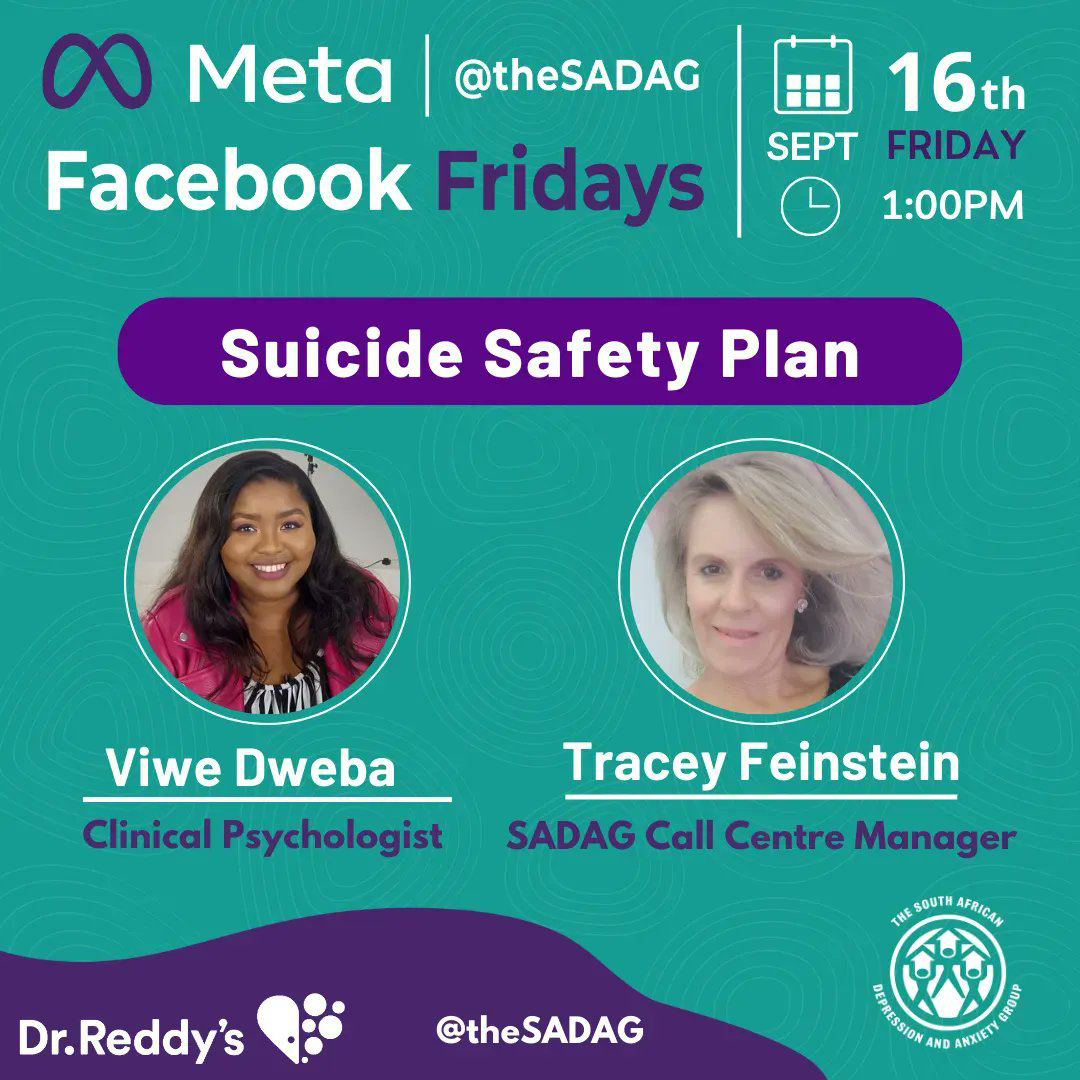
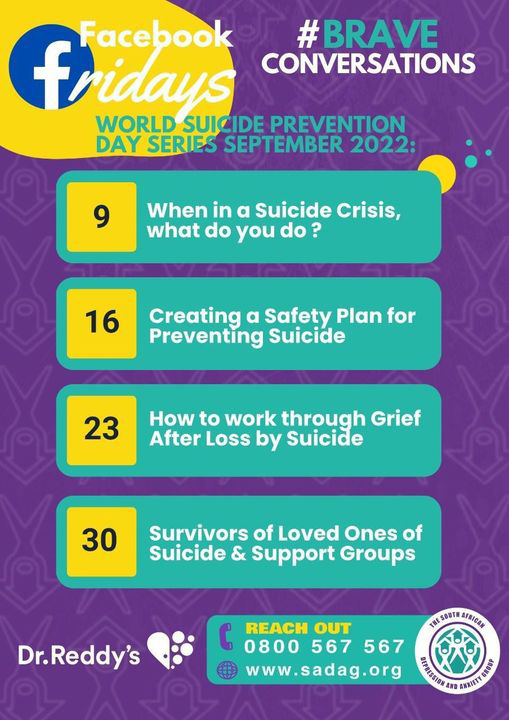
On Friday at 1pm, the South African Depression and Anxiety Group (Sadag) will be hosting a Facebook live discussion about “Creating a Safety Plan for Preventing Suicide”.
Speakers at the event will include Dr Viwe Dweba, a clinical psychologist, and Tracy Feinstein, a Sadag call centre manager.

On Saturday, 17 September, at 8am, there will be a cleanup at Alberts Farm Conservancy in Randburg, Johannesburg. Volunteers will be meeting at the 10th Street vehicle gate, Albertskroon.
The cleanup forms part of an “All Spruits Cleanup” in honour of World Cleanup Day.
“World Cleanup Day aims to raise awareness about the waste (particularly plastic) that is polluting our lands, forests, rivers, lakes and oceans around the world. It is also the largest annual single-day action and unites millions of volunteers and thousands of governments, corporations and organisations across 191 countries,” according to the event description.
Cleanups will be happening at a number of spruits in the Johannesburg area as part of the initiative.
For more information, contact Marianne Coetzee on 082 927 0451. DM/MC


















Comments - Please login in order to comment.